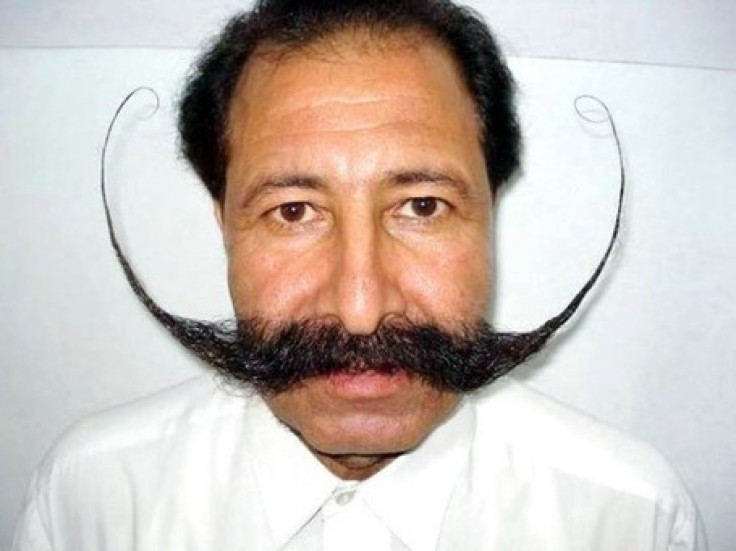A Moustache To Die For: Pakistan Islamic Extremists Threatens Man For Sporting Luxuriant Facial Hair

A Pakistani businessman named Malik Amir Mohammad Khan Afridi, 48, who has an extraordinarily luxuriant moustache, has lived under a cloud of death threats from Islamic extremists over what they perceive to be his disregard for the demands of modesty among devout Muslims. Afridi's moustache -- which measures an impressive 30 inches in length, lovingly and impeccably trimmed – has led enraged Taliban and other extremists like member of the Lashkar-e-Islam to kidnap him, extort money from him, displace him from his family, and even call for his death.
But not even the fear of meeting his maker has compelled Afridi from trimming his fabulous follicles. Indeed, according to a report from Agence France-Presse, he indulges himself half-an-hour every day to wash, comb, oil and twirl his moustache and guarantees that its ends curl up flamboyantly. ”People give me a lot of respect. [The moustache is] my identity,” the grandfather told AFP. ”I feel happy. When it's ordinary, no one gives me any attention. I got used to all the attention and I like it a lot.”
But the constant wave of death threats forced Afridi to relocate from the fundamentalist-dominated northwest region of Pakistan to the relative safety of Faisalabad in Punjab more than 300 miles away. He returns periodically to his hometown of Peshawar to visit family, but under extreme caution. ”I'm still scared,” he said. “I'm in Peshawar to spend Ramadan with my family but most of the time I stay at home and tell people I'm in Faisalabad if they want to meet me.”
Prior to moving to Faisalabad, Afridi told the Telegraph newspaper that in the northwest province extremists once “arrested” him and demanded he trim his whiskers. “They arrested me in broad daylight, put me in their car,” he said. “They took me to a religious scholar who declared the moustache un-Islamic and ordered it removed. There was nothing I could do. I was surrounded by guns. If I had resisted I would be dead."
However, after he moved away, he let it grow again. Afridi added that his family (wife and ten children) would like him to shave off the moustache and end the notoriety and inherent danger. “Sometimes my family [tells] me 'cut it, it would be better if you lived with us.' I can leave my family, I can leave Pakistan, but I can never cut my moustache again,” he said. “I don't like smoking. I'm not fond of [tobacco], or drinking. This is the only choice in my life. I'd even sacrifice food, but not the moustache. It's my life. It's not part of my life. It is my life."
As in the much of the Arab world and the Mediterranean region, a moustache has long symbolized masculinity and virility in India and Pakistan. But Islam (which encourages men to wear whiskers) requires that they be trimmed, although they generally allow beards to flow as far they please. There is also some doubt over how the Holy Quran views moustaches. The Prophet Muhammad apparently once declared: “Act against the polytheists, trim closely the moustache and grow [the] beard." Apparently, one of the principal objections to long moustaches has to do with hygiene, namely, that food particles could get caught in them. However, as Afridi himself pointed out, a chief adviser to Prophet Mohammed, Umar ibn al-Khattab, the second Muslim caliph, was renowned for his huge moustache which twirled up at the ends, just like his own.
With respect to Pakistani/Pathan culture (which is 1300 miles away from Saudi Arabia), even in the devout northwest, there is some internal disagreements over the wearing of extravagant mustaches. AFP reported that in Afridi’s native Khyber region, the government sometimes even pays anywhere from $10 to $60 per month to men who wear particularly impressive moustaches, as a celebration of the virility of Pathan culture. Such largesse has been handed out to both security forces and local tribesmen (two groups normally at odds with each other).
Richard McCallum, who wrote a book entitled “Hair India -- A Guide to the Bizarre Beards and Magnificent Moustaches of Hindustan,” told AFP that men with moustaches seem to command more respect, “are considered more virile, [and] more manly” ”When you get away from metro areas, India is still a patriarchal place,” he added.
Many prominent Pakistani politicians, business leaders and athletes wear well-groomed moustaches, although there are some notable exceptions, including the current Prime Minister Nawaz Sharif and leading opposition politician Imran Khan who are clean shaven. According to an unconfirmed legend, a moustache may have even cost the life of Murtaza Bhutto, the brother of former Prime Minister Benazir Bhutto. The story claims that during the mid-1990s after a particularly fierce argument between Murtaza and Benazir’s husband, Asif Ali Zardari (then the Minister of Industry and later President of Pakistan), Murtaza became so enraged that he fought with Zardari and somehow managed to shave off half of Zardari’s moustache. (Murtaza, who was already in a deep conflict with his sister, was later found dead).
Moustaches are even more prevalent in Pakistan’s neighbor, India. According to a (rather unscientific) survey conducted by AskMen.com, India is the world’s number one center for moustaches. An estimated 80 percent of men in southern India wear them. Indeed, policemen in India usually draw higher salaries than their clean-shaven peers as it makes them look more intimidating and authoritative.
© Copyright IBTimes 2024. All rights reserved.











